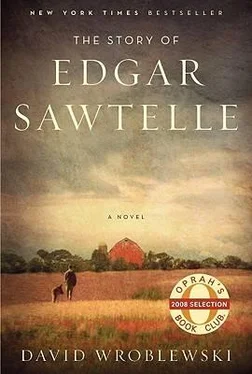
David Wroblewski
The Story of Edgar Sawtelle
For Arthur and Ann Wroblewski
There is grandeur in this view of life, with its several powers, having been originally breathed into a few forms or into one; and that, whilst this planet has gone cycling on according to the fixed law of gravity, from so simple a beginning endless forms most beautiful and most wonderful have been, and are being, evolved.
– CHARLES DARWIN, The Origin of Species
Pusan, South Korea, 1952
After dark the rain began to fall again, but he had already made up his mind to go and anyway it had been raining for weeks. He waved off the rickshaw coolies clustered near the dock and walked all the way from the naval base, following the scant directions he’d been given, through the crowds in the Kweng Li market square, past the vendors selling roosters in crude rattan crates and pigs’ heads and poisonous-looking fish lying blue and gutted and gaping on racks, past gray octopi in glass jars, past old women hawking kimchee and bulgoki, until he crossed the Tong Gang on the Bridge of Woes, the last landmark he knew.
In the bar district the puddled water shimmered red and green beneath banners strung rooftop to rooftop. There were no other servicemen and no MPs and he walked for a long time, looking for a sign depicting a turtle with two snakes. The streets had no end and he saw no such sign and none of the corners were square and after a while the rain turned to a frayed and raveling mist. But he walked along, methodically turning right twice then left twice, persevering with his search even after he’d lost his bearings many times over. It was past midnight before he gave up. He was retracing his route, walking down a street he’d traversed twice before, when he finally saw the sign, small and yellow and mounted high on the corner of a bar. One of the snakes curled back to bite the turtle’s tail. As Pak had said it would.
He’d been told to look for an alley opposite the sign, and it was there too-narrow, wet, half-cobbled, sloping toward the harbor, lit only by the signs opposite and the glow of windows scattered down its length. He walked away from the street, his shadow leading the way. Now there should be a doorway with a lantern-a red lantern. An herbalist’s shop. He looked at the tops of the buildings, took in the underlit clouds streaming over the rooftops. Through the window of a shabby bathhouse came a woman’s shriek, a man’s laughter. The needle dropped on a record and Doris Day’s voice quavered into the alley:
I’m wild again, beguiled again,
A simpering, whimpering child again.
Bewitched, bothered, and bewildered am I.
Ahead, the alley crooked to the right. Past the turn he spotted the lantern, a gourd of ruby glass envined in black wire, the flame within a rose that sprang and licked at the throat of the glass, skewing rib-shadows across the door. A shallow porch roof was gabled over the entrance. Through the single, pale window he saw only a smoke-stained silk curtain embroidered with animal figures crossing a river in a skiff. He peered down the alley then back the way he’d come. Then he rapped on the door and waited, turning up the collar of his pea coat and stamping his feet as if chilled, though it was not cold, only wet.
The door swung open. An old man stepped out, dressed in raw cotton pants and a plain vestment made from some rough fabric just shy of burlap. His face was weathered and brown, his eyes set in origami creases of skin. Inside the shop, row upon row of milky ginseng root hung by lengths of twine, swaying pendulously, as if recently caressed.
The man in the pea coat looked at him. “Pak said you know English.”
“Some. You speak slow.”
The old man pulled the door shut behind him. The mist had turned to rain again. It wasn’t clear when that had happened, but by then rain had been falling for days, weeks, and the sound of running water was so much a part of the world he could not hear it anymore. To be dry was temporary; the world was a place that shed water.
“You have medicine?” the old man asked. “I have money to pay.”
“I’m not looking for money. Pak told you that, didn’t he?”
The old man sighed and shook his head impatiently. “He should not have spoke of it. Tell me what you want.”
Behind the man in the pea coat, a stray dog hobbled down the alley, making its way gamely on three legs and eyeing the men. Its wet coat shone like a seal’s.
“Suppose we have rats,” the man said. “Difficult ones.”
“Your navy can kill some few rats. Even poorest junk captain does this every day. Use arsenic.”
“No. I-we-want a method. What Pak described. Something that works at once. No stomachache for the rat. No headache. The other rats should think the one rat went to sleep and didn’t wake up.”
“As if God take him in instant.”
“Exactly. So the other rats don’t think what happened to the one rat as unnatural.”
The old man shook his head. “Many have wished for this. But what you ask-if such thing exist-then whoever possess this second only to God.”
“What do you mean?”
“God grant life and death, yes? Who calls another to God in instant has half this power.”
“No. We all have that power. Only the method is different.”
“When method looks like true call of God, then is something else,” the herbalist said. “More than method. Such things should be brutal and obvious. It is why we live together in peace.”
The old man lifted his hand and pointed into the alley behind his visitor.
“Your dog?”
“Never seen it before.”
The herbalist retreated into his shop, leaving the door standing open. Past the ginseng, a tangled pile of antlers lay beneath a rack of decanters. He returned carrying a small clay soup pot in one hand and in the other an even smaller bamboo box. He set the pot on the cobblestones. From inside the box he withdrew a glass bottle, shaped as if for perfume or maybe ink. The glass was crude and warped. The top was stoppered and the irregular lip sealed with wax. Inside, a liquid was visible, clear as rainwater but slick and oily. The herbalist picked away the wax with his fingernail and pinched the stopper between thumb and index finger and produced from somewhere a long, thin reed whose end was cut on the oblique and sharpened to a needle’s point. He dipped the reed into the bottle. When it emerged, a minute quantity of the liquid had wicked into the reed and a drop shimmered on the point. The herbalist leaned into the alleyway and whistled sharply. When nothing happened, he made a kissing noise in the air that made the man’s skin crawl. The three-legged dog limped toward them through the rain, swinging its tail, and sniffed the clay pot and began to lap.
“That’s not necessary,” the man said.
“How otherwise will you know what you have?” the herbalist said. His tone was not kindly. He lowered the sharpened tip of the reed until it hovered a palm’s width above the dog’s withers and then he performed a delicate downward gesture with his wrist. The tip of the reed fell and pierced the dog and rose again. The animal seemed not to notice at first.
“I said that wasn’t necessary. For Christ’s sake.”
To this the herbalist made no reply. Then there was nothing to do but stand and watch while the rain fell, its passing almost invisible except where the wind folded it over itself.
When the dog lay still, the herbalist replaced the stopper in the bottle and twisted it tight. For the first time, the man noticed the small green ribbon encircling the bottle’s neck, and on the ribbon, a line of black Hangul letters. The man could not read Hangul but that did not matter. He knew the meaning anyway.
Читать дальше
Конец ознакомительного отрывка
Купить книгу













